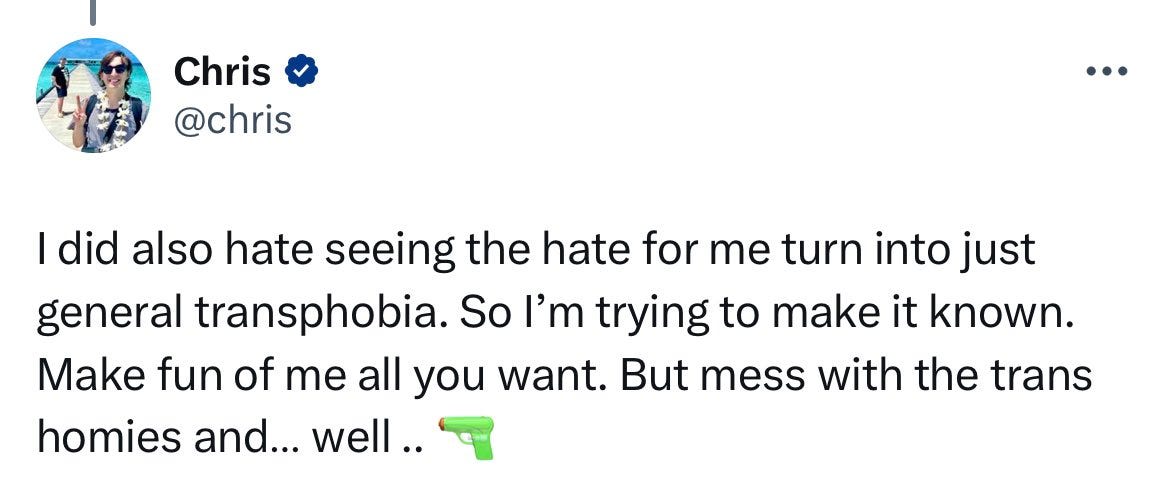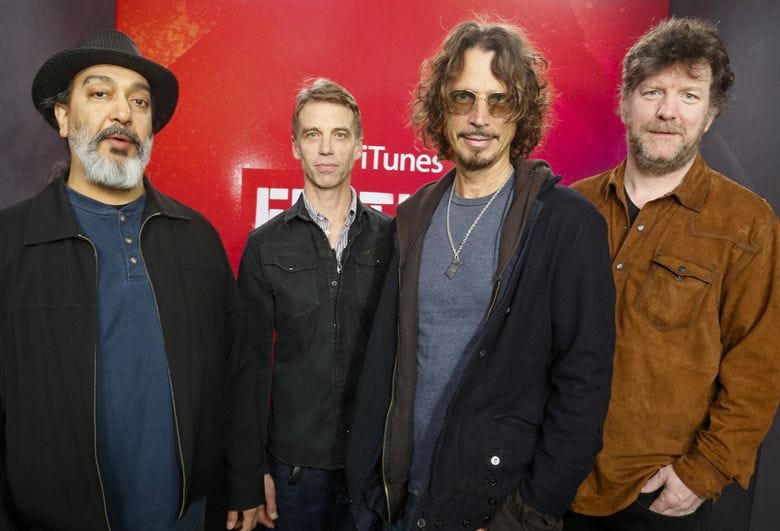Bud Light is Just Like Netflix's The Witcher, World's Biggest YouTuber Caught in Pedophilia Reference Scandal, J. Lo Makes a Cool Action Film? (The Five for 04/14/23)
Hey, welcome to The Five.
Culture & Commentary normally drops on Fridays…this one is a bit late, in part due to new projects I’m working on.
I’ll unpack those later this week.
OK, let’s dive in.
[one]
It’s quite rare The Five covers a topic twice a short period of time, but unlike the brand itself, this Bud Light story just won’t die.
This week, a clip surfaced of Bud Light’s VP of Marketing on a podcast where she stated:
this brand is in decline. It’s been in decline for a really long time. And if we do not attract young drinkers, there will be no future for this brand.
This means having a campaign that’s truly inclusive, and appeals to women and to men. Bud Light has been a brand of fratty, out-of-touch humor.”
Let’s pause there before moving on for a couple of observations.
A). Bud Light was the number one beer in America until a Belgian company bought Anheiser-Busch and screwed it up in 2008, mainly by firing the American leadership who held the legacy knowledge of the brand.
B). I don’t think it’s unfair to say Heinerscheid hates the Bud Light consumer base of blue collar sports fans, given her “fratty, out-of-touch” comments. In this way, Bud Light is suffering the same fate as Netflix’s The Witcher, which started out as a guarenteed hit (based on a mega-selling novel and video game franchise), and then tanked, causing star Henry Cavill (Batman v. Superman, Justice League) to leave in protest—allegedly due to the writing staff not taking the novels seriously, mocking the source material and making fun of the fans.
Heinerscheid could have easily reached out to a “more diverse audience” without alienating the core Bud Light consumer base…by just taking a page from the music industry.
It’s quite common for a band/artist to create a side project under a different name. A rock singer wants to explore EDM? No worries…just make up a new name, and try it out. If it fails, the main band isn’t hurt (the most painfully obvious example I can think of is Korn bass player Fieldy’s 90’s rap album—which was universally panned by critics, but didn’t hurt the multi-platinum rock band’s reputation with fans). Budweiser could have reached out to new consumers (Trans people, vegan snowboarders, whoever) by just introducing a new product catering to them.
And if it failed? No biggie. Nobody remembers that Fieldy rap record, right?
In the backlash-to-the-backlash, the mainstream media is desperately trying to prove Wokeness is good for corporate profit margins. Rolling Stone (a publication I once greatly respected and now mostly laugh at), published a “defense” of Woke brands, insisting Kuerig Coffee Makers (down 4%), United Airlines (up 20%), Carhartt (which is privately held, so the increase/decrease in sales isn’t available), Disney (down 27.5% in revenue, with 7,000 workers laid off in 2023) and the NFL (up in 2022, after they backed off Woke elements of the game/broadcast).
I’m not sure how much I want to even rebut Rolling Stone’s single factor analysis of highly complex business situations—but it’s likely that:
Kuerig is dropping because those machines make gross coffee,
United Airlines is up because people are dying to travel in a post-COVID world,
Carhartt is facing an increase because the brand is a fashion icon again,
Disney is down because their once-hit shows (like The Mandalorian) aren’t drawing much of an audience, and they haven’t had a hit at the Box Office in a year or so.
The NFL, an outlier on the list, seems to have pulled an audience back in from toning down the Woke. Or, maybe not. Maybe the ratings were just a good season, and curiosity about Tom Brady’s final run.
Cultural backlash (and/or support) when brands get involved in politics may have some impact on consumer behavior, but brands appear to be more affected by the quality of the products they produce.
But Light is getting a heck of a backlash, but also Bud Light has been fading since 2008. The Dylan Mulvaney controversy just brought more attention to something that was already happening, as opposed to causing it. Accelerated the situation? Quite possibly. But correlation does not equal causation.
As much as the media would love for us to believe that politics drives consumer behavior…the numbers point more towards people just buying what the like and believe in.
Politics in big brands may play a part in the rise and fall of sales, but they’re far from the only factor in play.
UPDATE: Maybe I was wrong about all of this. According to Beer Business Daily (which is paywalled, but covered here by Fox News), sales tanked in the Midwest and Southeast last week over the Mulvaney backlash.
It appears that the Bud Light boycott may be different than the response to the other brands, listed above.
[two]
Well, apparently the Trans stuff is at the center of every controversy this week.
If you’re not familiar with Mr. Beast (real name: Jimmy Donaldson), he’s the biggest YouTuber in the world, who makes a gagillion dollars entertaining (probably) jr. high students with prank videos. Think the Gen Z Justin Bieber, who doesn’t sing.
Over the weekend, Donaldson’s channel came under controversy when tweets of cast member “Chris” (only referred to by his first name) surfaced, containing references to pedophilia.
“Loli” refers to animated, sexualized young girls in Japanese anime.
Chris has locked his account, but another tweet referred to four year olds as “sexy” and a turn-on.
Chris, who recently started hormone therapy for a male-to-female transition, blamed the controversy on “transphobia” and made a reference to mass murder…which doesn’t sit well after the recent Nashville Christian school shooting.
Rather than address the implied child rape, or the implied murder threats…Mr. Beast also claimed this was a controversy of transphobia.
In this story…the dates are important.
Chris announced his transition in late March, apparently (I don’t watch the channel, due to not being 12 years old), but the controversy only sprung up over the weekend.
Even on one of the biggest YouTube channels in the world, an adult going on hormone therapy isn’t particularly newsworthy these days.
But an adult making references to raping kids and killing people most definitely is.
[three]
Well, this is a strange one.
Grunge pioneers Soundgarden were halfway through a new album in 2017 when singer Chris Cornell tragically took his own life.
Until this week, it was a question mark as to whether that music would ever be heard.
After more than three years of contentious litigation, Soundgarden and Vicky Cornell have reached an agreement paving the way for a future Soundgarden album. Though terms of the deal were not disclosed, news of the accord was announced by Cornell, the wife of late frontman Chris Cornell, and the band on Monday.
First filed in Florida before being transferred to Washington state, Cornell initiated the lawsuit back in 2019, preventing the band from using vocal recordings her husband had made before he died. The band claimed the seven recordings were intended for a future Soundgarden album that had been in the works at the time of the singer’s death in 2017. The album would be the band’s first new studio effort since 2012’s “King Animal,” which came together after the group reunited with a surprise Showbox gig two years earlier..
This is a tricky one…as it’s not uncommon for record labels to put out every snippet of audio after an artist’s death (see: how many bad, unfinished Notorious B.I.G. and 2Pac songs dropped in the 90’s and 2000’s…it’s doubtful either artist wanted those tracks to see the light of day).
On the flip side, Cornell’s widow blocking the release of an album…seemingly out of spite…is also very sad.
When an artist dies, there’s no “perfect” way to handle their un-released material. In this case, it seems that music fans should get to hear Cornell’s final efforts.
No word on the release date for the last Soundgarden album.
[four]
Two-thirds of moviegoers are not concerned about the length of a film’s release window when they visit a theater, and theatrical titles still enjoy a vast advantage in terms of awareness over original movies made for streaming.
Those are two of the many findings in The Symbiotic Future of Theatrical & Streaming, a new report from UTA IQ, the agency’s research and analytics group. The 55-page report offers extensive validation for the traditional theatrical release model, using data collected January 3 to 11 from 2,000 U.S. consumers between the ages of 15 and 69.
Two-thirds of Americans say the length of time from a movie’s release in theaters to its availability at home has little or no impact on their decision to see a movie in theaters.
That doesn’t mean movie theaters are packed again. One of the biggest trends of the last few years is the rise of a disproportionate number of horror films, which have a rather limited fanbase.
[five]
With all due respect to Jennifer Lopez (note: what I’m about to say isn’t very respectful), her main claim to fame seems to be…fame itself.
I can’t say that I’ve ever seen a movie with her, and I can only name one of her songs (not because I liked it, but because “Jennie From the Block” was inescapable in the early aughts).
But dang…The Mother looks fun. Plot wise, it’s basically a 2010’s Angelina Jolie action flick…without Angelina Jolie (hey, Lopez is probably cheaper for a straight-to-streaming project).
Releasing on Mother’s Day, for all the action-movie loving mothers out there, I guess.
Another MCU trailer…that I just don’t get at all. The biggest selling point of the Marvel movies is the interconnectedness.
It’s also one of the top reasons I skip most of them. I think the teenage girl was in a Disney+ show I never watched. Even as a huge sci-fi fan, I’m completely lost here, and I kinda liked (but didn’t love) Captain Marvel.
But The Marvels feels like too much work. I don’t want to go watch some non-hit TV streamer to understand a movie. This is a Q3 (November 10th) release, so Marvel apparently thinks they have a Black Panther: Wakanda Forever or Spiderman: Homecoming hit on their hands. In my opinion, they’re off to a rocky start with this one. What the heck are this trio even fighting against?
On the heels of the massive success of John Wick 4, Peacock just dropped a teaser for The Continental. Set in the 1970’s, the plot revolves around a hotel for assassins…
And speaking of movie-to-tv-criminal-underworld-adaptations…The Batman spinoff The Penguin will be hitting HBO Max (now called just “Max,” which is weird). Colin Farrell reprises the role, in heavy prosthetics.
Until the next one,
-sth









